Explore the enthralling discourse of China's historical and modern icons. From ancient philosophers like Confucius and revolutionary figures such as Mao Zedong and Deng Xiaoping, to modern-day influencers like Jack Ma and Yao Ming, China's speakers have shaped the nation's narrative. Hear about the impactful speeches that transformed politics, culture, and society, leaving a lasting imprint on the Chinese landscape. Discover the voices that continue to inspire change and progress, bridging the past with the present. Uncover the dynamic stories behind their words, revealing the evolution of China's powerful speakers through the ages.
Key Takeaways
- Confucius emphasized ethics and morality, influencing generations.
- Mao Zedong's speeches mobilized millions during pivotal moments.
- Deng Xiaoping's rhetoric revolutionized China's economy and development.
- Xi Jinping's 'Chinese Dream' speech emphasized national rejuvenation.
- Empresses like Wu Zetian were known for powerful speeches in history.
Ancient Orators in Chinese History
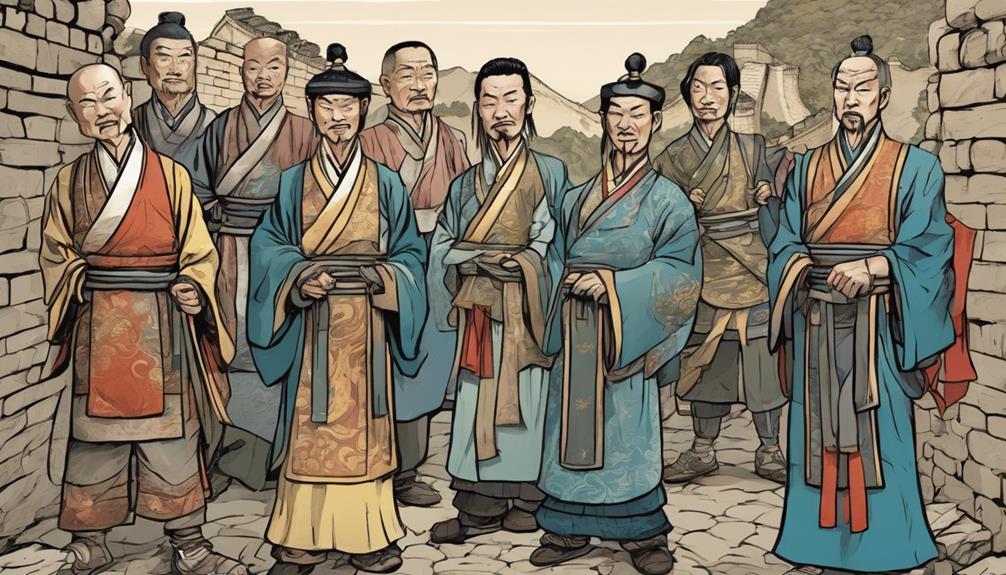
In ancient Chinese history, notable orators such as Confucius, Xunzi, Mozi, Han Feizi, and Mencius played significant roles in shaping philosophical and ethical discourse.
Confucius stood out for emphasizing ethics and morality, guiding many with his profound teachings.
Xunzi, a philosopher and speaker, stressed the importance of education and rituals in maintaining societal order and harmony.
Mozi, known for his persuasive speeches, passionately advocated for universal love and condemned the horrors of war, promoting peace and compassion.
On the other hand, Han Feizi, a legalist philosopher and speaker, believed in the necessity of stringent laws and centralized power to guarantee social stability and control.
Lastly, Mencius, a prominent orator, shared his belief in the inherent goodness of human nature and the pivotal role of benevolent leadership in fostering a just and prosperous society.
These ancient orators left an enduring legacy by influencing generations with their powerful words and profound philosophies.
Revolutionary Leaders' Impactful Speeches
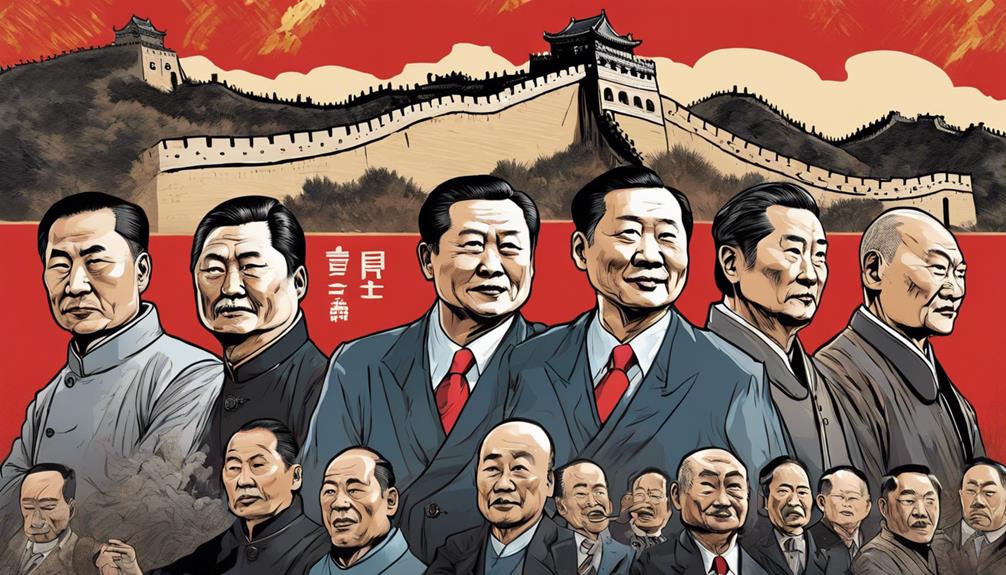
Revolutionary leaders in China have left a lasting impact with their powerful speeches, shaping the nation's history.
Mao Zedong, with speeches like 'On Protracted War' and 'On Contradiction,' played a significant role in influencing the Chinese Communist Revolution. His words resonated deeply, guiding the revolution towards success.
Deng Xiaoping, through speeches like 'Reform and Opening Up,' spearheaded China's modernization efforts, transforming the economy and society.
Sun Yat-sen's 'Three Principles of the People' laid the groundwork for the Republic of China, emphasizing nationalism, democracy, and the people's livelihood.
Jiang Zemin's advocacy of the 'Three Represents' theory aimed to modernize the Communist Party of China, adapting it to contemporary realities.
These leaders used their rhetoric to inspire change, mobilize the masses, and set the course for China's development, leaving a legacy of powerful words that continue to resonate in the nation's collective memory.
Influential Political Figures and Their Rhetoric
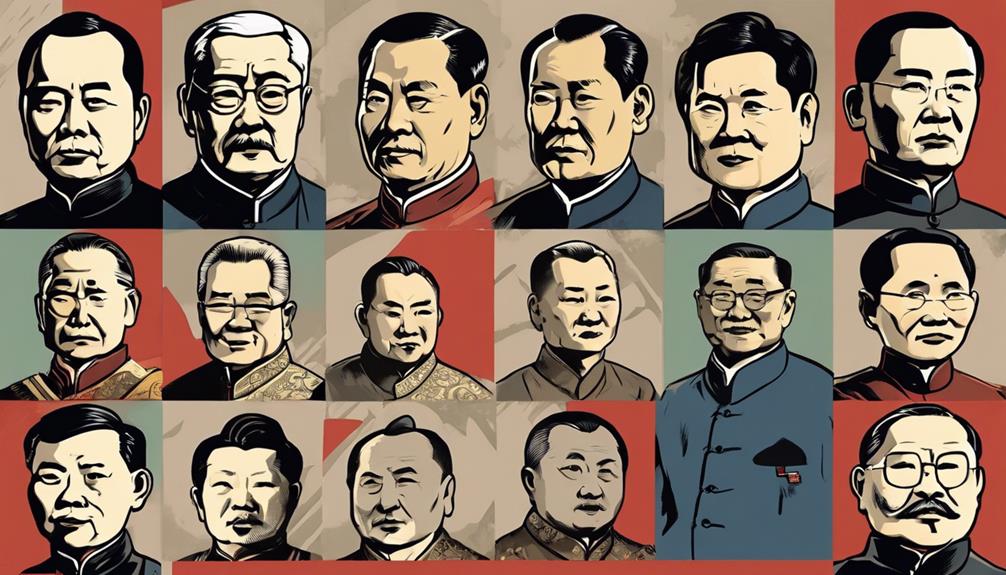
You'll explore the impact of famous political speeches by influential figures in China, analyzing the rhetorical strategies they employed to sway public opinion and shape national policies.
Understanding how these leaders used their words to inspire, unite, or enact change will provide insight into the power of effective communication in politics.
Delving into the nuances of their speeches will reveal the lasting influence these figures have had on China's historical trajectory.
Famous Political Speeches
Among the influential Chinese political figures, the speeches of Mao Zedong, Deng Xiaoping, Xi Jinping, Hu Jintao, and Jiang Zemin have shaped the course of Chinese history and society.
Mao Zedong's speech during the founding ceremony of the People's Republic of China in 1949 was a defining moment in Chinese history.
Deng Xiaoping's 'Reform and Opening-up' addresses in the late 1970s were instrumental in steering China towards economic transformation.
Xi Jinping's 'Chinese Dream' speech underscores national rejuvenation and prosperity for the Chinese people.
Hu Jintao's speeches were centered on fostering a harmonious society and sustainable development within China.
Jiang Zemin's 'Three Represents' theory sought to modernize the Communist Party to align with evolving societal dynamics.
These speeches not only reflect the ideologies of these leaders but also serve as guiding principles that have influenced policies and decisions shaping China's political landscape.
Impact of Speeches
During pivotal moments in Chinese history, the speeches of influential political figures have left a lasting impact on the nation's course. Mao Zedong's powerful rhetoric during the Chinese Civil War and Cultural Revolution mobilized millions, shaping the ideological landscape of China.
Deng Xiaoping's 'Reform and Opening Up' speeches in the late 1970s revolutionized China's economy, paving the way for significant growth and development.
Xi Jinping's articulation of 'The Chinese Dream' and the 'Belt and Road Initiative' have been instrumental in defining China's modern foreign policy and expanding its global influence.
Hu Jintao's emphasis on building a 'Harmonious Society' underscored the importance of social stability and economic progress in China.
Jiang Zemin's advocacy for the 'Three Represents' sought to widen the Chinese Communist Party's support base, influencing the party's direction.
These speeches haven't only resonated with the Chinese people but also steered the nation towards its current position on the world stage.
Rhetorical Strategies Used
Mao Zedong's persuasive rhetoric played a pivotal role in mobilizing the masses during the Chinese Communist Revolution in the mid-20th century. His powerful speeches inspired millions to join the cause, emphasizing the need for societal change and the empowerment of the working class.
Deng Xiaoping, in the late 20th century, adopted a pragmatic rhetorical style that focused on economic reforms and modernization. His clear and direct communication paved the way for China's rapid development and transformation into a global economic powerhouse.
Xi Jinping combines traditional Chinese values with modern political discourse to promote the 'Chinese Dream' and assert China's global influence. His rhetoric aims to unite the nation under a shared vision of prosperity and strength on the world stage.
Sun Yat-sen's revolutionary rhetoric in the early 20th century laid the foundation for the overthrow of the Qing Dynasty and the establishment of the Republic of China, inspiring a generation to fight for change.
Jiang Zemin's innovative 'Three Represents' theory incorporated new social classes into the Communist Party, showcasing his forward-thinking approach to rhetoric in the late 20th century.
Modern-Day Public Speaking Icons
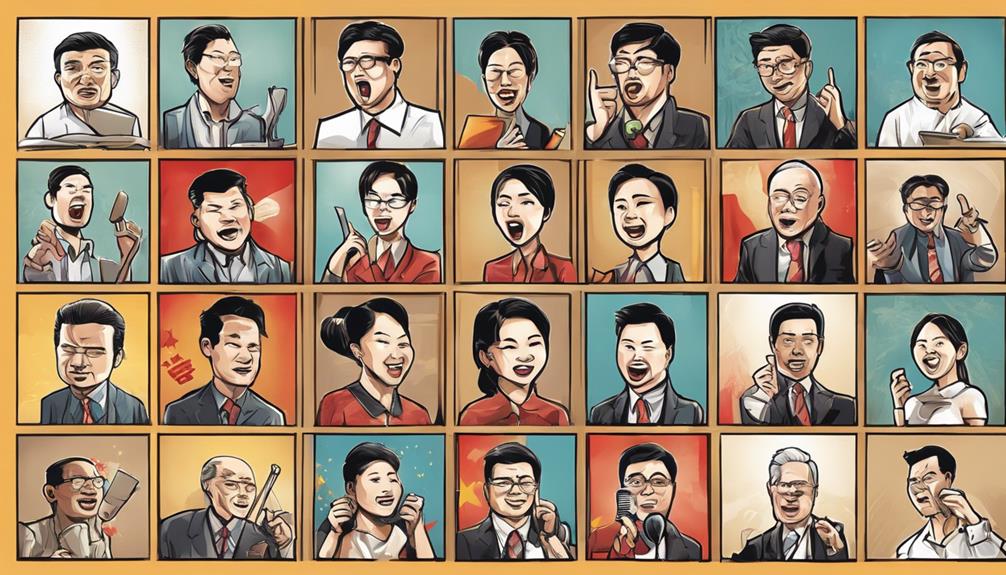
You'll discover the impressive profiles of modern-day public speaking icons in China, such as Li Ka-shing, Jack Ma, Yao Ming, and Zhang Xin.
Their impactful speeches cover a wide range of topics including business, entrepreneurship, philanthropy, and social issues, providing valuable insights and inspiration.
Get ready to learn from these influential figures about effective public speaking techniques and strategies.
Speaker Profiles
Modern-day public speaking icons, these influential individuals captivate audiences with their powerful voices and compelling messages.
Jack Ma, the founder of Alibaba Group, inspires crowds with his charismatic and motivational speeches on entrepreneurship and leadership.
Yao Ming, the former NBA star turned philanthropist, advocates for wildlife conservation and children's education through his impactful speeches.
Zhang Xin, the CEO of SOHO China, stands out as a prominent female speaker in the business world, sharing insights on real estate and urban development.
Lang Lang, the world-renowned pianist, mesmerizes listeners with eloquent talks on music education and cultural exchange.
Finally, Liu Cixin, the award-winning science fiction author, engages audiences with thought-provoking discussions on the intersection of technology and society, offering a glimpse into the future.
Each of these speakers brings a unique perspective and expertise to the stage, leaving a lasting impact on those who've the privilege to hear them speak.
Impactful Speeches
Xi Jinping, General Secretary of the Communist Party of China, commands attention with powerful speeches that underscore the significance of socialism with Chinese characteristics. His oratory skills resonate with millions, shaping China's domestic and international policies.
Jack Ma, the co-founder of Alibaba Group, captivates audiences with inspiring speeches on entrepreneurship and innovation, empowering the next generation of business leaders in China.
Wang Yi, Chinese State Councilor and Foreign Minister, delivers impactful speeches on China's foreign policy and international relations, shaping the country's diplomatic stance on the global stage.
Yao Ming, the legendary NBA player and Chinese basketball icon, motivates audiences with speeches on sports, philanthropy, and youth development, leaving a lasting impact on Chinese society.
Zhang Yimou, the acclaimed filmmaker and director, uses his speeches to advocate for the preservation of Chinese culture and arts, inspiring a new generation of creatives to cherish their heritage.
Together, these modern-day public speaking icons shape the narrative of China's future with their impactful words and visionary insights.
Public Speaking Tips
Effective public speaking relies on a combination of storytelling, humor, and emotional appeal to engage and connect with your audience. Modern-day public speaking icons like Barack Obama and Oprah Winfrey have mastered these techniques to deliver impactful speeches that resonate globally.
They skillfully use vocal variety, body language, and compelling visuals to captivate listeners and convey their message effectively. Public speaking coaching and consistent practice are instrumental in honing the skills of these influential speakers, enabling them to deliver powerful presentations that inspire and motivate millions worldwide.
Women Speakers Who Shaped History
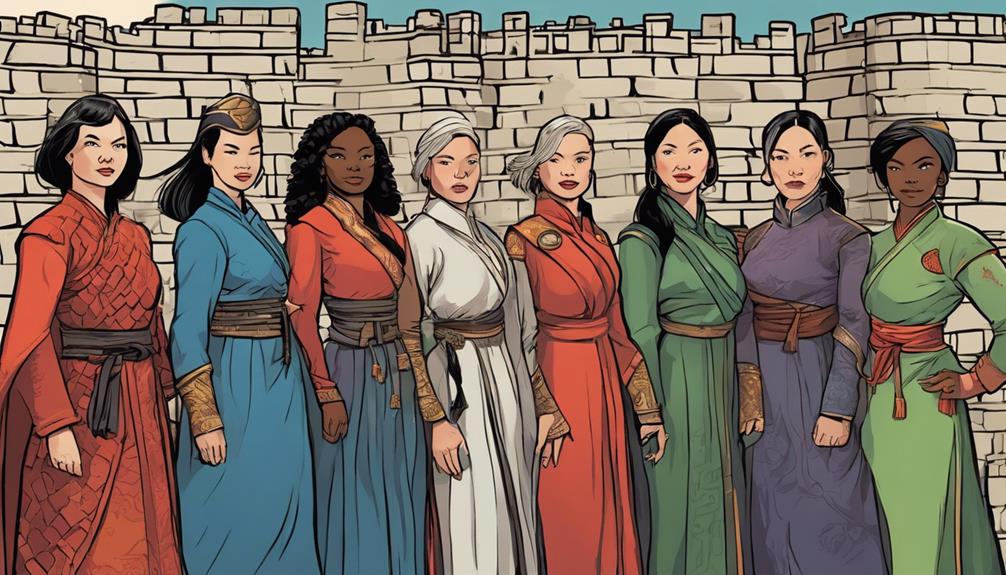
Several influential women speakers in Chinese history played pivotal roles in shaping the political, social, and cultural landscapes of their time.
Empresses like Wu Zetian and Cixi were renowned for their powerful speeches and political acumen, leaving a lasting impact on the dynasties they ruled.
Notable female poets and writers like Li Qingzhao and Zhu Yingtai used their words to challenge societal norms, advocating for change through their literary works.
Women philosophers such as Ban Zhao and Jiang Yan contributed significantly to intellectual discourse, offering unique perspectives that influenced philosophical thought.
Female educators like Yan Hui and Yu Xuanji inspired generations through their teachings and speeches, fostering a culture of learning and enlightenment.
These women speakers defied traditional gender roles, using their words to shape history and pave the way for future generations of women to have a voice in Chinese society.
Cultural Influencers and Their Powerful Words
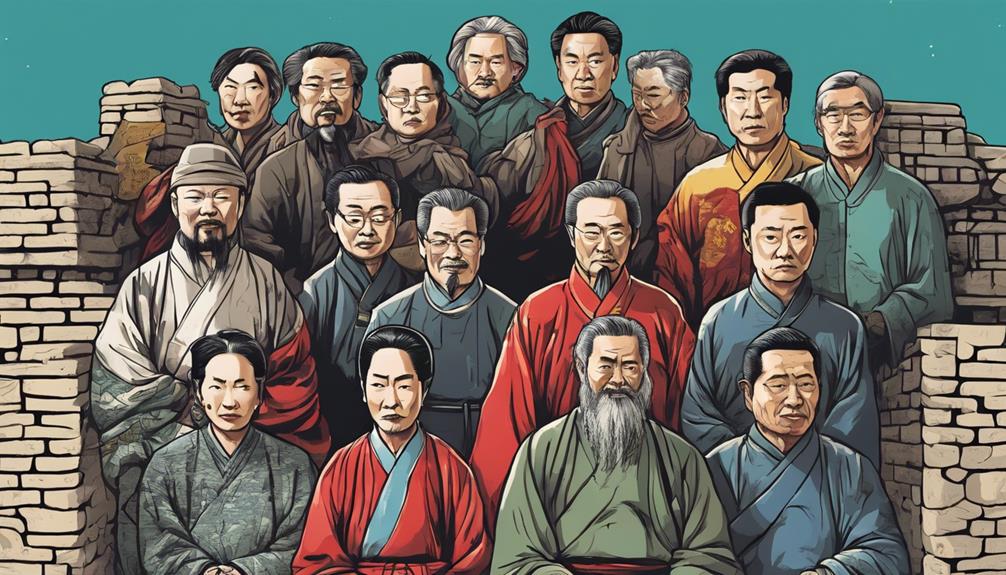
One of the most influential cultural influencers in Chinese history, Confucius, shaped generations with his teachings on ethics and morality. His philosophies emphasized the importance of family, respect for elders, and social harmony, leaving a profound impact on Chinese society.
Laozi, the founder of Taoism, also made waves with his philosophical work, the Tao Te Ching, which focused on living in harmony with the natural order of the universe.
Additionally, Sun Tzu's strategic military insights in 'The Art of War' continue to be studied and applied not only in warfare but also in business and leadership contexts.
Li Bai, a celebrated poet of the Tang Dynasty, captivated audiences with his lyrical verses that showcased the beauty of nature and the human experience.
Chairman Mao Zedong, the founding father of the People's Republic of China, wielded significant influence through his political ideologies, shaping modern Chinese history with his revolutionary thinking.
These cultural influencers used their powerful words to shape the beliefs, values, and actions of the Chinese people, leaving a lasting legacy in the cultural landscape.
Inspiring Speeches That Changed China

Mao Zedong's historic speech at the founding of the People's Republic of China in 1949 marked a pivotal moment in Chinese history. His words ignited a sense of national pride and unity among the Chinese people, setting the stage for significant changes to come. Over the years, several other leaders have delivered speeches that have shaped China's trajectory:
| Speaker | Speech | Impact |
|---|---|---|
| Deng Xiaoping | 'Reform and Opening Up' in the late 1970s | Paved the way for China's economic transformation |
| Xi Jinping | 'Chinese Dream' in 2012 | Emphasized national rejuvenation and prosperity |
| Hu Jintao | Addresses on building a harmonious society | Focused on social stability and unity |
| Jiang Zemin | Speeches on the 'Three Represents' theory | Aimed to modernize the Chinese Communist Party |
These speeches, each in their own right, have been instrumental in shaping China's political, social, and economic landscape, leaving a lasting impact on the nation and its people.
Frequently Asked Questions
Why Is the Great Wall of China One of the 7 Wonders?
The Great Wall of China is one of the Seven Wonders due to its historical significance and massive scale. Construction began in the 7th century BC, spanning over 21,000 kilometers to defend against invasions.
What Are 5 Interesting Facts About the Great Wall of China?
Interested in the Great Wall of China? Did you know it spans 21,000 km, features beacon towers for military signals, and was manned by a million soldiers? Explore Mutianyu, Jinshanling, Badaling, Gubeikou, and Simatai for unique experiences.
Is the Great Wall of China One of the 7?
No, the Great Wall of China is not one of the 7 most powerful speakers in China. It is a historic and architectural landmark known for its defensive role against invasions, not for speaking.
How Many Died Building the Great Wall of China?
You might wonder how many souls perished to build the Great Wall of China. Historians estimate hundreds of thousands, if not millions, of laborers died due to harsh conditions, attacks, accidents, starvation, and weather.
What Qualities Make a Speaker Stand Out Among China’s Most Powerful Speakers?
Among China’s most powerful speakers, mastery in public speaking is a vital quality that makes a speaker stand out. The ability to captivate, inspire, and articulate complex ideas with confidence and clarity sets these individuals apart. Mastery in public speaking allows them to connect with their audience at a deeper level.
Conclusion
So, there you have it – the great wall of words built by China's most powerful speakers throughout history. From ancient orators to modern-day influencers, their impactful speeches have shaped the course of Chinese history.
These inspirational words haven't only motivated generations but have also influenced change and progress in the nation.
Keep exploring the power of words and let them guide you on your own journey towards greatness.









